Request a Free Assessment

While dogs are man's best friend, that relationship didn't develop overnight. Creating a strong bond with a dog takes time, patience and lots of training. Dog obedience training is one of the best ways to deepen the bond between dog and owner.
Training a new dog takes a lot of time and effort but the payoff is well worth it. Some dogs may require more training than others due to breed type, past trauma, or just plain stubbornness. However, all dogs can become loyal, friendly and well behaved through dog obedience training with Dog Training Elite Pittsburgh’s programs, including in-home training!
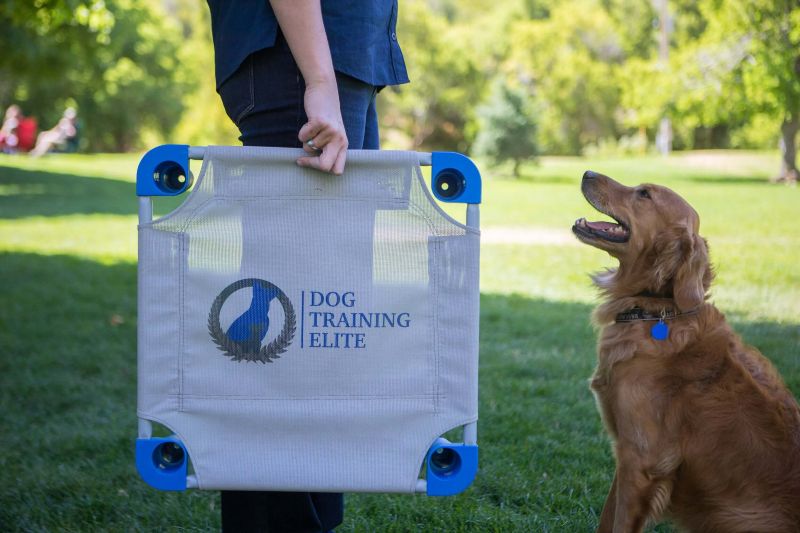
Se habla español!
Not all training packages may be available at our Dog Training Elite Pittsburgh location, please reference our pricing page for complete information on services offered.
In-Home Training
Dog Training Elite Pittsburgh has specialized training courses for both puppies and older dogs. For in-home training, dog trainers will observe dog breed, size, temperament and any other factors that will influence training.
Working with the dog and dog owner directly in an owner’s home, dog trainers will develop a personalized training plan for basic commands like sit, stay, come, heel, etc.; as well as to address any unique issues such as anxiety, aggression, fear and so on. Once a dog is trained, owners can sign their dogs up for group classes with more in-depth training.
Starting with in-home training is an unmatched service that provides dogs and dog owners with the opportunity to work together. Not only does in-home dog obedience training free dogs from the distractions of a group class, but ensuring a dog is learning from both their owner and a trainer will help owners and dogs strengthen their bond. Dogs that learn only from trainers may be inclined to disobey when the trainer is not around. Equally sharing the task of training between dog and dog owner leads to the development of trust and deepening love.
Trainers from Dog Training Elite Pittsburgh seek to not only help train dogs, but empower owners so they can continue training their dogs in years to come. This includes sharing tips and tricks (treats are always a good thing!), as well as pointing out personality traits and behavior issues dog owners should focus on.
The Dog Training Elite Pittsburgh Difference
There are numerous dog obedience training methods out there, which can be broken down into three main theories: traditional, modern and balanced.
- Traditional training typically relies on punishment for errors, and “low value” rewards such as praise or petting when a dog performs a desired behavior. In recent years traditional training has fallen out of favor.
- Modern training, which is more science-based, focuses more on positive reinforcement when a desired behavior occurs and doesn’t worry about correcting bad behavior. This training method has many benefits, including faster learning for dogs, less stress and anxiety for dogs, ability to teach more complex behaviors, and of course, a better experience for dog owners and trainers.
- Balanced training theory, while it sounds like the best of both worlds, still incorporates the use of punishment as a training tool.
Dog Training Elite Pittsburgh uses modern training methods focused on positive reinforcement and bonding between dog and dog owner. Dog Training Elite Pittsburgh never resorts to the use of punishment to help dogs unlearn bad behavior. The difference becomes clear when comparing a dog that is trained out of anxiety and intimidation vs a dog who truly desires to please from the inside out.
The Dog Training Elite Pittsburgh training theory is mostly based around classical conditioning, also known as the Pavlovian method or respondent conditioning. This includes developing conditioned or automatic reflexes to commands. In its simplest form (after proper conditioning), when an owner says "sit," their dog automatically sits without thinking about it.
Through a combination of commands and an electronic collar, dogs learn to follow commands at once. The electronic collar is not a shock collar; it is a gentle electronic pulse, similar to the tug of a leash, used to get the dog’s attention. Other dog trainers use harsh static collars or spray collars which have been shown to be less effective. Dog Training Elite Pittsburgh’s method of focusing on positive behavior reinforcement nurtures a dog's loving and naturally obedient nature.
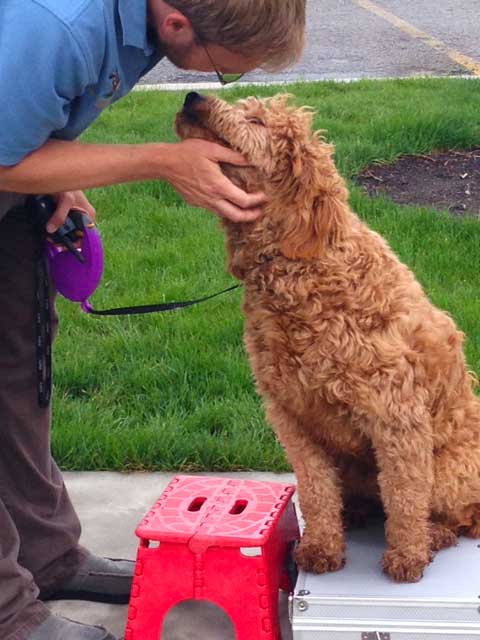
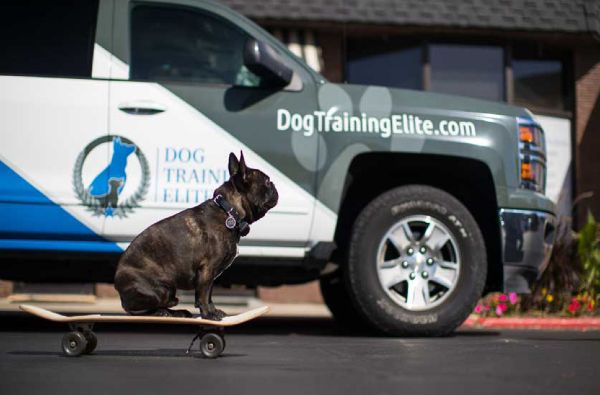
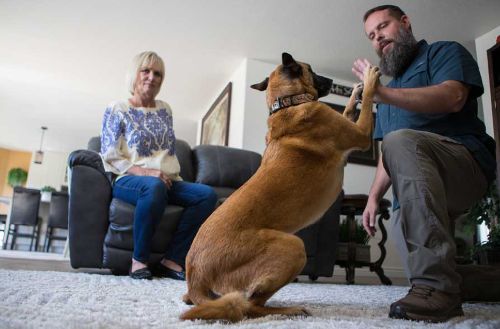
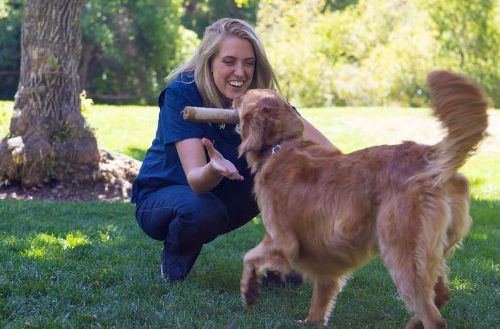

Our Balanced Theory
We base our training around the "Classical Conditioning" model (a.k.a. "Pavlovian" or "respondent conditioning"). This includes developing conditioned or automatic reflexes to commands. In its simplest form (after proper conditioning), when the owner says "sit," the dog automatically sits without thinking about it. Our unique techniques ensure our program is a success no matter what behavior we encounter.
Empowering Owners
We empower owners to train so their dog knows who to obey at all times.
Personalized
We deal with problem behaviors on a personal basis.
Environment Specific
We train wherever issues tend to arise (i.e. jogging, park, home).
Supportive
We support owners in the off-hours (when training is "not in session").
Involved
We work with all members of the household.
Simplified & Customized
We plan training around the owner's schedule and require only 20 min/day follow-up practice.
Continued Training
Additional programs / group sessions offered after in-home training.
Lifetime Investment
We follow up & are invested in the owner's success long-term.
Satisfaction Ratings
Our high client satisfaction rating sets us apart from competitors.
clas·si·cal con·di·tion·ing PSYCHOLOGY noun A learning process that occurs when two stimuli are repeatedly paired; a response that is at first elicited by the second stimulus and is eventually elicited by the first stimulus alone.
Start Your Obedience Training Journey
Dog Training Elite Pittsburgh knows the prospect of starting dog obedience training can sound daunting. But with our knowledge trainers and proven, gentle method, you and your pet can conquer obedience training without using any harsh shock collars or demanding training.
Dogs and dog owners can bond and work together to have a successful, enjoyable training process. Contact Dog Training Elite Pittsburgh today to start your dog obedience training!
Obedience Training FAQs
What age can a dog start obedience training?
The earlier, the better. Puppies are welcome! That being said, old dogs truly can learn new tricks - there is no reason an older dog can’t learn basic commands.
What issues will obedience training address?
Besides basic commands like sit, stay, heel, etc., dog obedience training can address issues such as chewing, whining or barking, jumping to greet others, and begging for food.
Are shock collars used?
No. Pain or punishment is never used in any form during training programs. A combination of positive reinforcement and an electronic collar has proven to be 100% successful. The electronic collar produces a gentle “tug” to get a dog's attention. It is not a shock collar and does not harm or alarm a pet.
Why in-home training?
In-home training is necessary because it allows trainers to focus on the particular issues of individual dogs (like terrorizing a pet cat or chasing the mailman). During in-home training sessions trainers also work side by side with owners and any other family members so the dog understands who is in control.
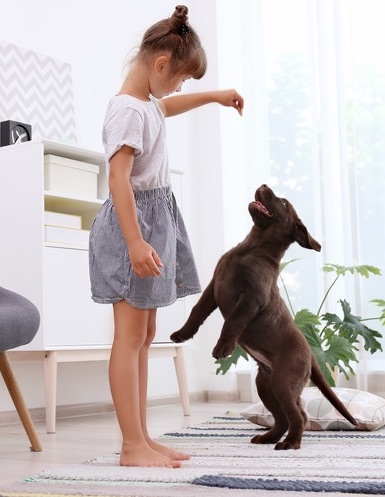
We help your dog become a valued companion and beloved member of the family. Read what our customers have to say and then give us a call!
I stopped Vince in South Park’s parking lot after he had just finished a training program out there and asked him a question about an issue I’m having with my new dog. He was so kind, helpful and informative. He gave me multiple suggestions on how to address the issue. He knew a lot specifics about my breed of dog and dog behavior in general. If you are looking for a good, honest person to help you with training your dog Vince is your guy!— Lora
Posted September 7th 2024
My wife and I now have our fifth German Shepherd. The first three lived between 10 and 14 years. Number four died unexpectedly at seven. That was 19 months ago. We've had our Long Hair German Shepherd, Teddy, for 18 months now. At four months Teddy completed her basic puppy training. Shortly after that we began looking for a seasoned, mature professional trainer. We found what we were looking for when Vince Conrad of Dog Training Elite came to our house to see if we were all a good fit for each other. We started our six in home training and finished up with Teddy making great progress! Both Teddy and I feel like we both had the best training! I like to think of the in home training as the class room work. We have now completed six of the 12 group training sessions with six more to come. I call the group sessions the "field work". Each session builds off the previous session. Vince is so skilled and patient. He is always firm, with a calming demeanor. When Teddy was about nine months old it was nearly impossible to take her for a walk. At 73 I need a dog that will walk with me without pulling me down the road. Last week we were out for a walk when we came to our neighbors house. They were out at the curb waiting to see Teddy. As we got to the couple I told Teddy to sit, and she did. They spent a bit of time to pet her and to make a fuss. I then told her down to which she got all the way down and stayed there calmly until I commanded her to "come". This couple are trained Greyhound rescue "parents", their son is a professional dog trainer and their daughter is a Vet. Their final comment to me carries a lot of weight. They said that Teddy's progress is remarkable. I hope my experience with Vince helps you make a decision about finding the right trainer. I can't thank Vince enough. Don Creasy Pittsburgh— Allie Creasy
Posted September 2nd 2024
Wish I could give 10 stars. They are so awesome and amazing at what they do! Tonya was incredible and got me and my dog to exactly where we wanted with the training! Best in the area!— Will Porter
Posted August 20th 2024
I only have good comments about my experience so far with Dog Training Elite. Not only with the knowledge and experience of Vince, but also his patience and generosity. He was able to assess and understand my dog very well and adapted the training according to her needs and behaviors. He was there when I was discouraged and ready to give up, I can’t be more grateful.— Cynthia Desjardins
Posted August 13th 2024
My dog Sage and I worked with Vince from Dog Training Elite Pgh and we couldn't be happier. Vince was very knowledgeable and patient providing clear guidance to me how to best help Sage learn new skills. I was amazed at how quickly Sage picked up sitting at the front door when people arrive (instead of jumping on them) and going to her place and staying for relatively long periods of time (20-30 min). I highly recommend Vince!— Ilana Diamond
Posted August 7th 2024
Vince has helped my dog Fig and I with so much training. Before training, my dog was reactive with so many things including kids, other dogs, neighbors and more. Not only has he hep me with her reactivity that has improved way more than I could have, the communication between my dog and I is stronger! She understands what I’m asking of her, she walks better with me, and she listens better. We go hiking off leash, camping, and so much. I feel more comfortable taking her places that I couldn’t before. I’m so glad I can take her with me more without the anxiety of how she is going to react. Vince is a great trainer who is patient calm and diligent!— Jinnelle Little
Posted June 30th 2024
Nick and I reached out to Vince to help with our 4 year old German Shepard, Rosa, with reactivity issues, leash training, and to help boost her self obedience. We knew the moment we met with Vince he was going to be super helpful to our family. He took the time and patience to explain all the ins and outs of this journey. He never was watching the clock during our training sessions, was great in making suggestions to get the biggest bang for our buck during sessions, and captured this awesome photo of us on Rosa’s last in house training session. We still have group sessions available to us that we are very excited to start with Vince and the other clients/dogs that he works with. We are grateful for his services and see the improvements in our pup!— Kayla Burzio
Posted June 17th 2024
I knew training would be very important for my very energetic Aussie. Vince from Dog Training Elite has been the perfect person to train us! Liam had several issues causing him to not be able to enjoy life to the fullest. However these last few weeks with Vince he has progressed to a more confident and happy pup. I can't wait to see where he goes from here! Thanks so much for the help.— Rebecca Gillenwater
Posted June 17th 2024
I am so glad we found Vince. We've had other dogs over the years, but never sought out a trainer. And never could bring our dogs out much to public events or handle them well on walks.I always felt a little inadequate as a dog owner. Lots of love, but little discipline. We wanted a smaller dog this time, thinking she would be easier to control for a 70-something couple. This time we decided to seek help from a trainer. Vince has essentially given us the skills, the techniques, the patience, and the understanding of consistency to make all our lives better...including Olive. Vince is gentle, knowledgeable, and a very good teacher. He has made the training process seem so easy and the results are often instant (and lasting as long as you practice, practice, practice). Olive is a happy, well-behaved, loving dog (2-years old in September). I had a dream for years of having a "therapy" dog to take into healthcare facilities. We are now confident that Olive will be able to fulfill my dream and that she will continue to build her confidence without stress or frustration. Vince made this all possible. He is the best!!— Judith Gusky
Posted June 17th 2024
Vince has been the best experience for training with loki. Loki was scared and, Vince took his time in building trust with loki. Loki has come a far way and building confidence and obedience, thanks to Vince. Vince is easy to work with and always there if you have any questions. I’m glad I found Vince for loki, it’s been a pleasure continuing to working along side a great trainer.— karie turner
Posted June 2nd 2024
Our family couldn't be happier with the results of our training sessions with Vince! It was worth every penny! Admittedly, we were nervous about e-collar training at first. Vince answered all of our questions calmly and reassuringly. Having Vince train our 18 month old lab in our home was a real game changer. He addressed challenges in real time and was always happy to work with us to customize the training to our needs. Best of all, it is clear that Vince loves his canine clients. This alone made it so easy to trust him with our puppy. His calm and confident demeanor put both our dog and his pack (our family) at ease. Vince clearly puts the client's needs first. He never seemed like he was in a hurry to leave and he was always available for questions when they occurred outside of our training time. The opportunity to continue practicing with the group sessions is another benefit that we just love. We completed our 6 sessions recently and continue to practice regularly with our dog. Already he is calmer at the door, more polite when greeting guests and his regular recall is outstanding. Additionally, his recall with distractions is noticeably improving. We live near a lake in the summer and our pup is living his best life as he can be off leash more and more. Everyone who sees him comments on what a well-behaved boy he is . I am so glad we found Dog Training Elite!— M P
Posted May 30th 2024
Super excited to get started on training with Dog Training Elite. We just had our consult and feel great and very hopeful that our Jasper is going to have every opportunity to be the best doberman ever and for us as owners to be the best owners for Jasper.— DeAnna Harris
Posted May 11th 2024
Mr Conrad is an excellent trainer he has helped my fear aggressive border collie gain confidence now our daily walks have become a lot easier and she hardly reacts to people and other dogs. Overall this was an amazing experience— Briana Lanay
Posted January 28th 2024
I have a 2 year old. Lab and I can’t say enought. About how her training from Vince at Dog Training Elite Pittsburgh has helped her and is! Vince is very knowledgeable about training with individual one on one class and group classes. Whatever you need help with your dog Vince can fix it! I have a well behaved dog now that only continues to get better as she gets older . He is reasonably priced and is always available for questions or new concerns. DTEP gets my outstanding review. Give Vince a call ! You will be very happy with his training for your dog!! Sincerely, Linda Z— Linda Zemanick
Posted December 8th 2023
Vince was always punctual and sympathetic to my concerns regarding dog training/behavior. He gave thorough explanations and was flexible with the agenda of each class, tailoring them to my priorities. Even before signing on with him, he provided an in-depth consultation and answers, with examples, to all my questions. He was encouraging, yet realistic, and openly discussed the ongoinging responsibilities of the dog owner throughout the training process. I highly recommond Dog Training Elite Pittsburgh to any owner who wants to reach the next level of dog obedience and is willing to put in the required work necessary thereof.— Czarina Grace Michka
Posted November 13th 2023
Vince is the trainer that I needed for Dakoda-my 9mth old German shepherd. I tried other trainers and didn't get results. Vince is calm and patient and works to train you, not just your dog. I live a little bit out of his usual area, but Vince went the extra miles for me, and I am so thankful he did!— Lynn Bacha Antonucci
Posted September 11th 2023
Vince is the trainer that I needed for Dakoda-my 9mth old German shepherd. I tried other trainers and didn't get results. Vince is calm and patient and works to train you, not just your dog. I live a little bit out of his usual area, but Vince went the extra miles for me, and I am so thankful he did!— Lynn Antonucci
Posted September 11th 2023
My dog Teddy is still in training. He got nearly all his one to one trainings at our home with Tonya and now he has been in 3 group sessions so far. Tonya is not just knowledgeable and experienced as a dog trainer but her best qualities are her natural love for animals, her patience and her way to make them what we considered impossible. Teddy is a 7 MO sheepadoodle puppy and gets too excited around dogs and other people. He wish to play all the time so he gets jumpy and drags us whenever he wants to be playing. Tonya has been able to teach him basic commands and has been helping us to teach him to stay quieter. If you are in the need to get professional help along with loving care with your pup, Tonya and Luis are your answer. I recommend them 100%!— Steven Padin-Aquino, P.E.
Posted July 21st 2023
Vince is a wonderful dog trainer. He met Henry and I at no cost to assess his good and bad behaviors at home. Vince’s calm, patient and kind demeanor made me confident that he would be able to train Henry and educate me every step of the way. After our first training session Henry stopped nipping “puppy biting” at my sleeves and ankles. We have since worked on learning new commands and skills together that make having a puppy more enjoyable and even fun. I would recommend Vince to anyone who is looking to have a better relationship with their dog and who is even interested in service dog training.— Taylor Koch
Posted July 6th 2023
Vince is a wonderful dog trainer. He met Henry and I at no cost to assess his good and bad behaviors at home. Vince’s calm, patient and kind demeanor made me confident that he would be able to train Henry and educate me every step of the way. After our first private training season Henry stopped nipping “puppy biting” at my sleeves and ankles. We have since worked on learning new commands and skills together that make having a puppy more enjoyable and even fun. I would recommend Vince to anyone who is looking to have a better relationship with their dog and who is even interested in service dog training.— Taylor Koch
Posted July 6th 2023